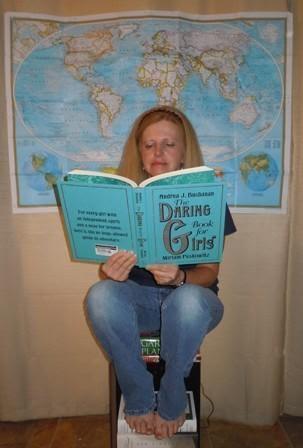The Good Sister By Cheryl Hughes
In most families that contain more than one girl, there is usually that one daughter who is the good sister. She is the one who tries to believe the best about the others, the one who tries to keep everybody together. I say that from observation, as well as from experience.
Have you ever read the book, THE HIDING PLACE, by Corrie ten Boom? The book recounts the efforts of her family—Dutch watchmakers by trade—to protect Jews who were being sought by the Nazis during WWII. The ten Boom family was found out and shipped off to German concentration camps. Corrie and her sister, Betsie, were sent to Ravensbruck, a women’s work camp in Germany. The book was made into a powerful movie, of the same name, and the scenes I remember with clarity are the scenes in which Betsie encourages Corrie not to hate the guards who are being so cruel to them. Corrie has a deep sense of justice, and she wants to hurt the guard who is particularly cruel to her sister. Betsie died in the camp in December, 1944 at the age of fifty-nine. Before she died, she told Corrie, “There is no pit so deep that He [God] is not deeper still.” Corrie is eventually released from the camp, and years after the war, offers forgiveness to that very guard as a way to honor her sister. (THE HIDING PLACE, by Corrie ten Boom, and John and Elizabeth Sherrill, Bantam Books, 1974)
In the book HAVING OUR SAY (Amy Hill Hearth, Kodansha America, 1993), Sadie and Bessie Delany, two African American sisters living through the civil rights struggles of the sixties, tell the story of their hundred years together. Sadie is the sister who has the need for justice. Bessie is the sister who knows “You catch more flies with honey than you do with vinegar.” During their young adult years, this country had separate water fountains, bathrooms and even sections in department stores for black people. Bessie would go into a department store to try on shoes and sit down in the white section to do so. One particular store owner, who was some-what embarrassed about the store policy, would gently tell Bessie she should move over to the other area. Bessie would smile and act like she had made a mistake then move to the designated black area. She carried out this ruse on a steady basis. Sadie would get so mad, telling her sister she knew that man must think she was the stupidest woman on earth. Bessie knew what she was doing, long before Rosa Parks sat down at the front of the bus.
A couple of weeks ago, I went to my stepmom’s birthday celebration at my brother’s house. There are a bunch of us, and it’s really loud when we all got together. After we ate lunch and had cake, we gathered around Mom to watch her open presents. There was still a lot of racket going on, as the paper tore, boxes opened and cards were passed around. Eventually, everybody gravitated back to their previous conversations, no longer interested in what was in the next box.
I watched my younger sister, Rhonda, pick up the small package she had bought for Mom. I remembered thinking of all the hardship she had been through this past year after losing her husband. The hardship wasn’t just emotional, it was also financial. It had always been financial for her and her family.
As Rhonda opened the box for Mom, everyone got quiet. She said, “Mom, when I saw this, I wanted you to have it. It’s your birthstone. There are little diamonds around it. They’re real diamonds. There’s a receipt in the box in case you break it. It’s guaranteed. At the store, I said to myself, ‘I don’t know if I can afford this,’ then I remembered that time I found you in the closet crying because you and Dad couldn’t afford to get us school clothes that year. You deserve this, Mom.”
As I watched my sister put the necklace around my mom’s neck, I began to cry, because of the sacrifice she was making. Not the financial sacrifice, although it was a great one for her. It was the sacrifice of forgiveness, a sacrifice I have never completely given my dad or stepmom, that pierced me through. Rhonda had been the one to take the brunt of the rejection, the derision and the physical pain my three sisters and I endured for years at my parents’ house.
When I look at my stepmom today, I know she is a different person than she was when she raised me, but that sense of justice that Corrie ten Boom and Sadie Delaney had rears its head inside of me also. The book of James says, “Mercy triumphs over judgment.” I’ve read that. Rhonda knows that.
That’s why she is the good sister.



























